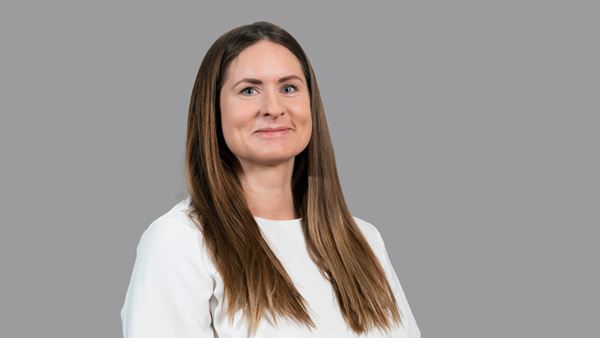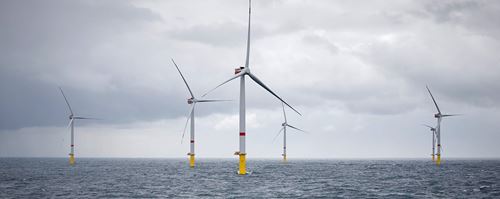We spoke to Mari Kvinnesland, Sustainability Manager at Fred. Olsen Windcarrier, to learn more about her role, what sustainability involves, and how she makes sure our employees and the environment stay safely protected.
Can you tell us a little about yourself?
I am 35, living in Oslo. I am originally from Norway, which is also where I completed my bachelor’s degree in Health, Safety, Environment, and Quality (HSEQ) engineering. During my studies I also took a semester abroad, where I focused more on sustainability topics, which has proved very useful for the position I have today.
How did this lead you to Fred. Olsen Windcarrier?
After finishing my degree, I started working in the oil and gas industry as a HSEQ consultant, mainly with offshore oil rigs. I wasn’t looking to change jobs, but I had heard about this very interesting company in the renewables industry called Fred. Olsen Windcarrier. When the oil crisis hit, I realised it could be the right time to start making enquiries. Fortunately, the perfect position at Fred. Olsen Windcarrier became available, and I made the move.
I was initially hired as a HSEQ advisor, but my role now is Sustainability Manager and a Designated Person Ashore (DPA)
What is your role at Fred. Olsen Windcarrier?
I was initially hired as a HSEQ advisor, but my role now is Sustainability Manager and a Designated Person Ashore (DPA). These are two different things, but there is of course a lot of overlap between them.
As DPA, I am an important link between the crew on board a vessel and the management team onshore for all safety- and environment-related concerns. I work closely with the HSEQ department to make sure all relevant protocols are followed, and if crews need to raise an issue with senior management, which rarely happens, then my job is to make sure all the right people are aware and involved.
My primary role, however, is as Sustainability Manager. I am responsible for maintaining sustainability best practices onboard our vessels and across our offices. This is closely related to this DPA role because it is not only concerning the environment, but sustainability across all aspects of the company, including social, business ethics, and governance.
How do you ensure our vessels are operating sustainably?
I am involved in setting objectives, following-up on progress, and reporting internally as well as externally. In doing so, I love the fact that I get to work alongside many talented colleagues in virtually every department – I feel fortunate to work in a company where real engagement for environmental sustainability is alive across the organisation.
For example, we have installed variable frequency drives on our vessels to reduce CO2 emissions and we have banned the use of plastic bottles, so there’s no risk of any being thrown overboard. I am pleased to say that we have also reduced our plastic waste in general.
Of course, sustainability isn’t purely an internal initiative; an important part of my role is to keep an eye on new and existing regulations that we need to comply with. For example, right now I’m focusing on the EU’s European Green deal, which involves a huge amount of legislation, and the IMO’s FuelMaritime regulation.
It is a fascinating time to be in the industry, as there is a steady flow of new laws coming into force that directly impact our operations, such as EU ETS, EU Taxonomy, and European Sustainability Reporting Standards, to name a few.
What are the social aspects you have to deal with?
This concerns matters such as human rights, equality, anti-discrimination, bullying, and harassment. For this I work alongside our HR and Crewing department to raise awareness and to ensure all employees are aware of the rules that must be followed – and do so!
Especially in an industry where there are different nationalities working together (our crew is mainly from the Philippines, while management is primarily from western Europe), these social aspects need to be handled sensitively. However, we would not be the successful business we are today if this wasn’t done well, and I am proud to say that we have an excellent track record and a zero-tolerance policy towards any misconduct.
If you take a bullying or harassment, for example, this is a topic that all industries have to be aware of. However, for us, our crews often are male dominated, far from home, and isolated together for prolonged periods of time, all of which inevitably increases risk.
At Fred. Olsen Windcarrier, we believe that open communication is essential to help mitigate these problems. We hold regular Work Environment surveys and workshops to highlight the potential issues and to help build a proactive and positive culture, as well as focusing on what to do in case of an incident. It’s all about removing the barriers and creating transparency, so people feel supported and safe. At the end of the day, we are one big family, regardless of our background!
I love being involved in sustainability for an industry I believe in

What excites you most about your job?
That’s easy – I love being involved in sustainability for an industry I believe in! I’m very grateful to work closely with such talented people across our organization to make this happen. No two days are ever the same, and I get to wake up every morning knowing that I am contributing to the welfare of our employees and improving the world we live in. What could be better than that?
How do you make employees aware of the requirements?
Our policy is defined in our Personnel Handbook and reflected in our Code of Conduct, which helps to ensure we always maintain the highest ethical standards.
All employees are given copies of the Code of Conduct as they join the company, and the latest version is always available on our web page. In addition, we hold training sessions for all employees on CSR, anti-corruption, and anti-bribery upon their employment, which is repeated every second year.
What’s next for sustainability in the offshore wind industry?
There is so much happening right now. I think that we will soon see a lot more transparency in our industry and increasingly we will have to share data, ideas, and results.
This will be extremely beneficial and give us a much more meaningful framework for comparison. Not only will this enable Fred. Olsen Windcarrier to progress in key areas, but it will help our industry to build a more dependable supply chain and supplier network for the future.
